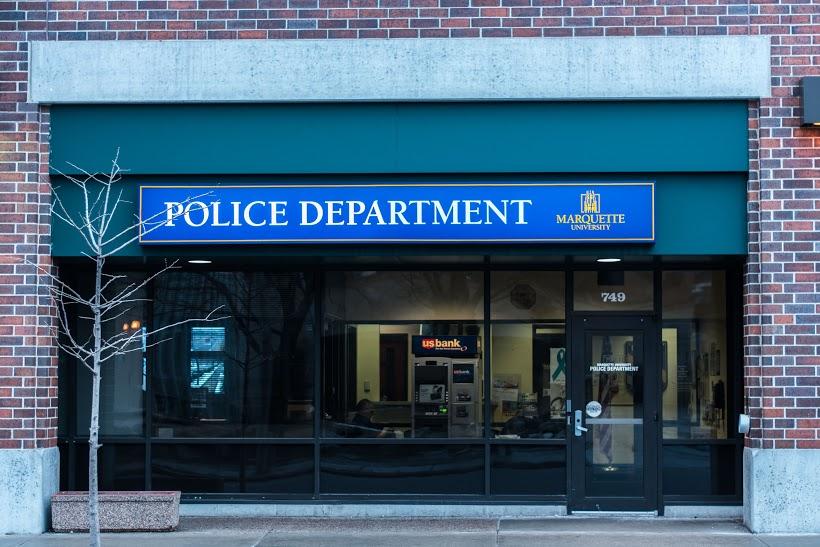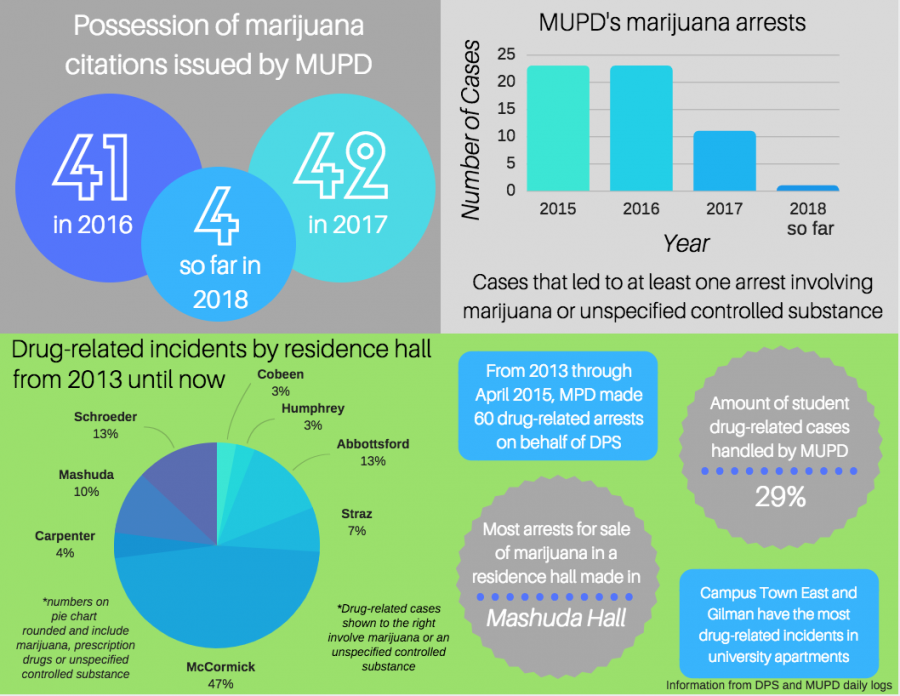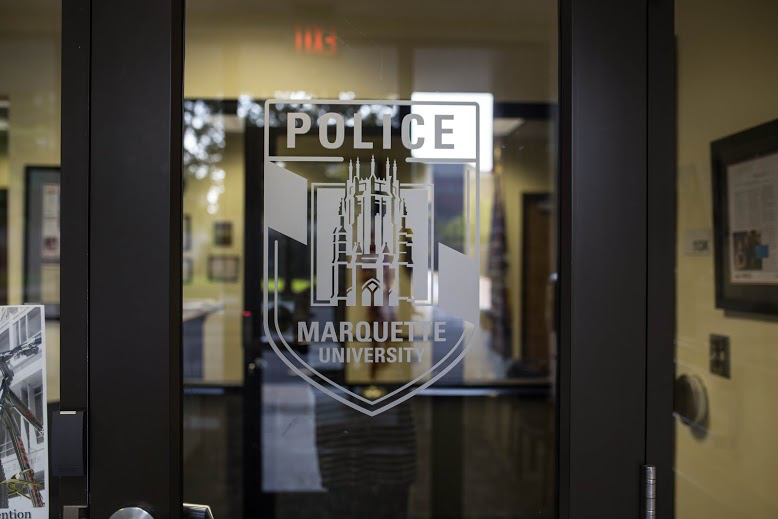
What would happen if a building on campus received a bomb threat? A gunman entered a classroom and opened fire? A spilled chemical in a classroom resulted in a hazmat situation with students still in the building?
Medical and security emergencies can happen at any time, usually without warning, making an emergency preparedness plan essential at Marquette.
But what if your roommate had an asthma attack? An allergic reaction? Fell off a loft and was knocked unconscious? Wouldn’t wake up?
Would you know what to do?
Emergencies in university housing
All resources on campus defer these situations to DPS.
Rick Arcuri, associate dean for administration in the Office of Residence Life, said he hopes students living in the dorms and university apartments would contact a staff member in case of an emergency in university housing. That staff member is trained to call the hall director on duty and DPS.
Prior to the arrival of students on campus, resident assistants and apartment managers are trained extensively on the resources available to them in the case of an emergency — including those provided by DPS and Student Health Service.
They are not, however, trained in CPR or anything more than basic first aid.
“We don’t want them treating people,” Arcuri said. “We will leave that to those who are better prepared to handle that.”
An RA in McCabe Hall said ORL is aware the lack of medical training given to resident assistants is a concern. She asked not to be named because ORL does not permit RAs to speak to the media.
“They don’t want to train us (on how to address medical emergencies) because then expectations are placed on us and people think that we should know what to do,” the RA said. “From the perspective of a resident assistant who has dealt with several medical emergencies, it would be nice to have basic training and a basic understanding of what to do in those situations.”
Several problems with adding medical training to RA training are the cost and the inability of any training to cover all situations, the RA said.
“We have such a great working relationship with DPS,” the RA said. “I trust them to handle any situation.”
Should a student in university housing need to go to the emergency room, ORL has trained RAs and apartment managers on the correct agency to contact.
Student Health Service maintains a contact person in the Aurora Sinai Medical Center emergency room who also works with ORL.
“We have found that the ER staff are very welcoming to us,” Arcuri said. “They go out of their way to help us when we do bring students over to keep in touch so that we know what is going on and can assist the student when they return to campus.”
[youtube]yE-ww8jKAAE[/youtube]
Prepping a plan
On a larger scale, Marquette has assembled an 40-member Critical Incident Management Team that updates and tests the university’s critical incident management plan on a regular basis, said Paul Mascari, a lieutenant in the Department of Public Safety.
“It involves a lot of coordination with our department and really is a campus wide effort,” Mascari said.
All departments of Marquette participate, including the provost and the senior vice president. The Office of Marketing and Communication and Information Technology Services determine how communications with students will occur in emergency situations.
Toby Peters, associate senior vice president, is the situation unit leader of the Critical Incident Management Team. His role is to coordinate the critical incident management plan and ensure that the plan is routinely reviewed and updated. The team was created following the terrorist attacks in New York City on Sept. 11, he said.
“We had some protocols in place (before Sept. 11) but we didn’t have a comprehensive plan,” Peters said. “We needed to be able to respond more effectively.”
The plan uses self-evaluation, such as running test scenarios and evaluating incidents at universities across the country, to determine if Marquette’s plan has the capacity to deal with a similar event, Peters said.
“After Katrina we took a closer look at (the plan), and we refined it,” Peters said. “After incidents at Virginia Tech and Northern Illinois University, the key players of the team were gathered together to review what had happened. (DPS Chief) Larry Rickard, spoke with the chiefs at those schools.”
Simulating a crisis situation
In the summer of 2008, the university ran a simulation where a tanker filled with fuel crashed into Carpenter Tower. Last summer, the scenario was a tornado that threatened Mashuda Hall.
The university hired Pre-Emergency Planning, LLC, a consulting firm that establishes disaster readiness, to work with the Marquette team to create emergency simulations. To date, these drills have focused on the quality of the university’s plan in case of a lack of communication or essential personnel in a crisis situation.
The Critical Incident Management Team runs these drills, usually during the summer, to test the emergency plans in place and make changes to aspects of the plan that need improvement.
“Most of these things are highly improbable,” Peters said. “You do things that force you to think about how well you are prepared. We went through all of our emergency response activities, including simulated press conferences, identifying where we were going to house the students and communicating with the Marquette community and the Milwaukee community.”
In the event of a large-scale emergency on campus, most departments said they feel very prepared to handle anything that may occur.
“All of our contingency plans have been established to anticipate as many crises as we can,” Peters said.
Managing a critical incident
Crisis levels assist university officials in deciding which course of action needs to occur. Situations are rated on a scale of one to three, from lowest to highest severity.
In the event of a threat of injury or a threat to life, Rickard has the authority to identify a crisis as level three, Peters said. He is then responsible for the response to the incident.
“If time is of the essence, the decision would be up to the chief, though typically it is a collaborative effort,” Mascari said.
The team meets in a critical response room at an undisclosed location on campus, Peters said. The room is stocked with Internet and phone access and information about university resources including contacts in different university departments and throughout Milwaukee. ITS is responsible for assembling the room and maintaining the resources housed inside.
“(Rickard) has all the university resources available to him to address the situation,” Peters said.
At any time, Peters said the university can expect approximately 30 members of the team to be available to respond. By including all senior administrative officials, access and knowledge of all university resources can be made available to the crisis managers.
The plan further calls for utilizing all available means of communication in the event of an emergency. This includes e-mail, the university Web site, university voice mail, text messages, Access TV message boards, postings in buildings both on- and off-campus and use of megaphones or other devices as needed, according to a press release issued by the Office of Marketing and Communication.
The team is currently working on improving the texting services offered to students, faculty and staff at Marquette. Peters said there are currently more than 7,000 cell phones registered for the plan.
Tim Olsen, communication manager in the Office of Marketing and Communication, said the Marquette emergency text messaging system, textMU, will be tested on Nov. 3.
“The purpose (of the test) is to determine how quickly and thoroughly the text messaging system can send a mass text message to students and employees in an emergency,” Olsen said.
The Critical Incident Management Team felt that a test of the texting system was necessary to determine how quickly the messages would reach students, Peters said.
Dispatching DPS
Across Marquette’s campus, calling DPS is the initial response to almost any type of emergency.
Upon receiving a call reporting a medical emergency, the DPS dispatcher attempts to obtain as much information as possible about the situation before alerting the correct personnel in DPS, Mascari said. Two DPS officers are dispatched to every incident.
Susan Hopwood, outreach librarian at Raynor Library, said library staff members are given very simple instructions in their training – call DPS.
“Fortunately, our experience with dire medical situations has been limited,” Hopwood said. “Public Safety is responsive and gets medical assistance here immediately.”
DPS officers are certified using the Red Cross’ CPR, AED — a portable defibrillator — and First Aid for the Professional Rescuer training. An AED is a portable defibrillator. This training is a step up from basic CPR training and a step down from training for medical professionals like emergency medical technicians and paramedics, Mascari said.
Every DPS squad car is equipped with a medical kit. Two cars also have AEDs. Other departments on campus, such as the Al McGuire Center, also maintain AEDs on location, Mascari said. Although the medical kits include more than an average first aid kit, they still include the basics, such as gloves, bandages and CPR masks.
DPS also contacts the Milwaukee Fire Department when responding to medical emergencies, Mascari said. DPS officers are trained to administer medical care until MFD arrives and takes over.





Baby first aid • Nov 12, 2009 at 12:28 pm
Nice blog but i’m having some minor problems with the design in Opera Browser, maybe i should change Browser!